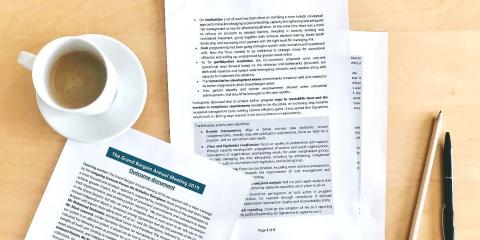The Grand Bargain Bimonthly updates - September 2019
Please find the full September Bimonthly updates here and below.
The Grand Bargain is continuing full speed ahead in autumn. As you'll see below, workstream 9 finalized the harmonized reporting (8+3) template, which is now ready for roll-out. Some donors and UN agencies have committed to do so already, but more Signatories need to adopt the template in order to achieve the collective progress that the Grand Bargain intends to achieve. Workstreams 7&8 just concluded an important workshop to move forward with enhanced quality funding through reduced earmarking, multi-year planning and funding. Workstream 2 held their last of the three regional events to understand better the national and regional experiences of localisation, and are preparing for their global conference in October. Finally, following a mapping exercise on overlapping priorities and in an effort to strengthen collaboration between the IASC and the Grand Bargain initiative, OCHA, as the current Chair of the Facilitation Group (FG), represented the FG in the Results Group Co-chair meeting on 10 September 2019 to discuss how to strengthen the linkages between the Results Groups and the work of the workstreams. You'll find further updates from the workstreams and upcoming activities below.
Last but not least, as the FG 2018/19 finishes its mandate at the end of September, we would like to take this opportunity to thank Sweden, USA, OCHA, UNICEF, IFRC, and InterAction for their significant investments and relentless efforts over the last year to steer the Grand Bargain and move forward with achieving more efficiency and effectiveness of the humanitarian system. We look forward to welcoming the new FG members in October 2019.
Best wishes,
The Grand Bargain Secretariat
|
Latest from the workstreams
Localisation: wrap-up of the regional conferences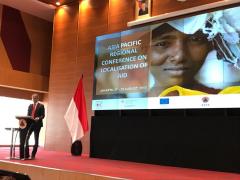 |
Cash: Two new priority areas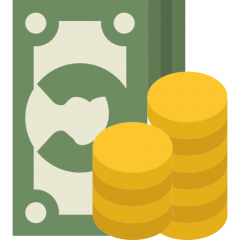
As a result of the discussions held during the third Grand Bargain (GB) Cash workstream workshop held in Rome in May, two new priority areas have been created to increase the leverage of the work carried out in the cash workstream, better coordinate with other workstreams and improve the inclusion of local partners. One is related to tackling political blockages to effective cash, and one to local partnerships. >> Click here to read more.
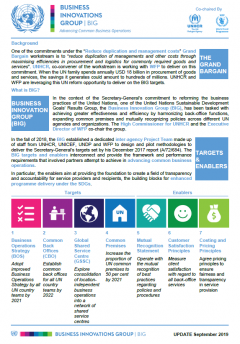 Progress on reducing duplication of management and other costs through maximising efficiencies in procurement and logisticsOne of the commitments under the “Reduce duplication and management costs” Grand Bargain workstream is to “reduce duplication of management and other costs through maximising efficiencies in procurement and logistics for commonly required goods and services”. UNHCR, Co-convenor of the workstream, is working with WFP to deliver on this commitment. When the UN family spends annually USD 18 billion in procurement of goods and services, the savings it generates could amount to hundreds of millions. UNHCR and WFP are leveraging this UN reform opportunity to deliver on the Bussiness Innovation Group (BIG) targets. >> Click here to see the progress |
Participation revolution: developing a workplanWorkstream 6 Co-convenors USA and SCHR have been conducting meetings since the Annual Meeting in June, as they develop a new workplan to take them through to 2021. They have updated the workstream mailing list and are working with key stakeholders, including OCHA, the CHS Alliance and the IASC Results Group 2 (Enhanced Accountability and Inclusion) to build upon the develop a zero draft of the workplan which should go out to the workstream members in mid-September for comments and proposals. The aim is for their workstream plan to complement and build upon work already being done by technical specialists, the IASC and other groupings, while empowering champions of effective participation across the humanitarian ecosystem, whether they are project officers in frontline partners or CEOs and Board members.
One area of concern is the gap in participation by local actors who may be represented in the Grand Bargain by the NEAR network or ICVA. Please do encourage local actors to participate by sharing their contact details with Gareth Price-Jones (SCHR) to become a workstream member. |
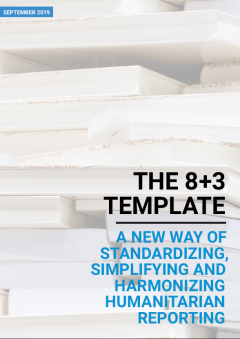 Harmonized Reporting Template finalized and ready for roll-outFollowing the conclusion of the pilot phase of the harmonized reporting template, the 8+3 template has been finalized. The review process underlined that the 8+3 template represents a useful tool to reduce the reporting burden for partners, while providing the necessary information for donors. The more donors adopt the 8+3 template as a standard, the greater the benefit of harmonization of the 8+3 template, reducing the reporting burden across the humanitarian system. Some donors and UN agencies have committed to do so already, but more Signatories need to adopt the template in order to achieve the collective progress that the Grand Bargain intends to achieve. >> Click here for further information and to see the template |
Next steps
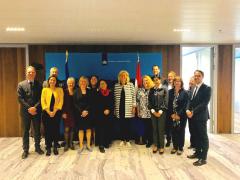 New Facilitation Group to take over in October 2019As the Facilitation Group 2018/19 finishes its mandate end of September, a new Facilitation Group will take over beginning of October, consisting of OCHA, WFP, ICRC, and SCHR, while two new donor members will be announced shortly. We would like to take this opportunity to thank Sweden, USA, OCHA, UNICEF, IFRC, and InterAction for their significant investment and relentless efforts over the last year to steer the Grand Bargain and move forward with achieving more efficiency and effectiveness of the humanitarian system. |
Coming up
| 25 September 2019 | Money Where it Counts: A protocol for harmonised cost classification and financial budgeting and reporting |
| 23-24 October 2019 | Global Conference on Localisation of Aid |

